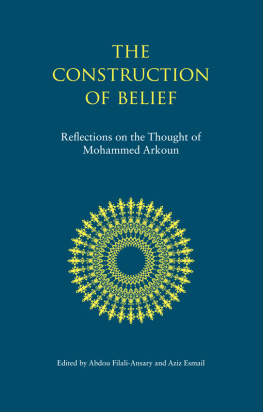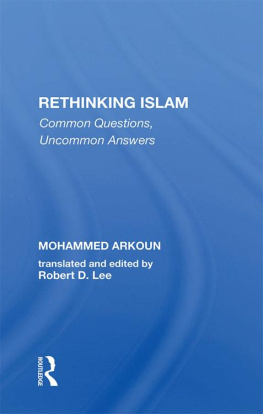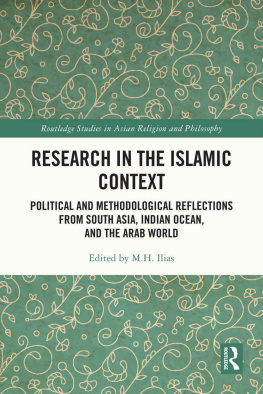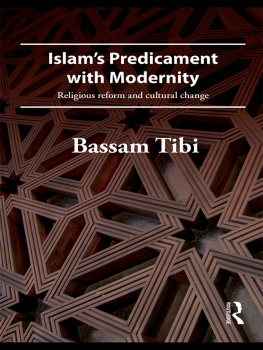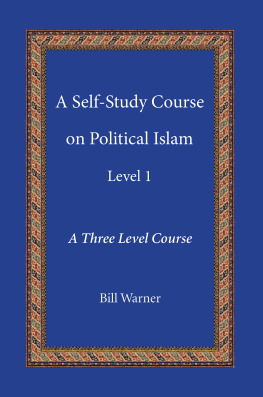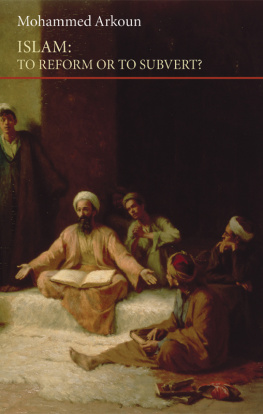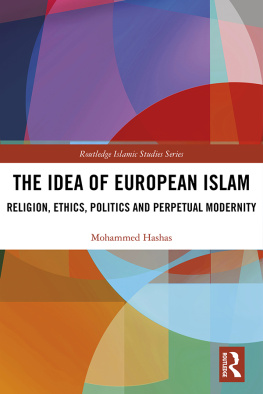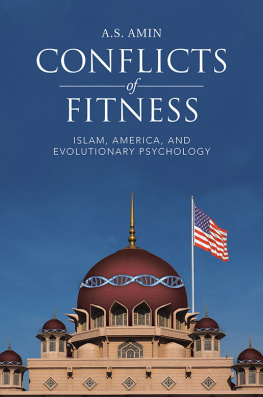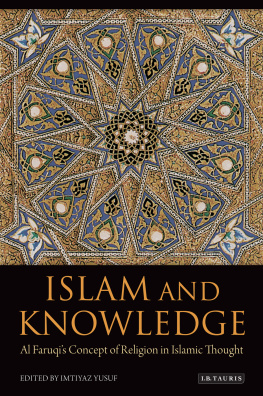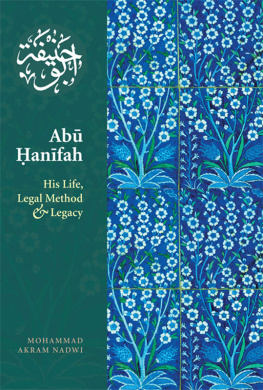THE CONSTRUCTION OF BELIEF

The Construction of Belief
Reflections on the Thought of Mohammed Arkoun
Edited by
Abdou Filali-Ansary and Aziz Esmail
SAQI

Contents
Preface: Situating Arkoun
Abdou Filali-Ansary
Mohammed Arkoun:
A Personal Tribute and an Intellectual Assessment
Aziz Esmail
The Authenticity of Sacred Texts
R. Stephen Humphreys
Constructing Islam in the Classical Period:
Maqalat Literature and the Seventy-Two Sects
Josef van Ess
Modern Discourses of Superiority:
Muslims and Christians in Contact
Stefan Wild
The Political, Social and Technological Construction of Understanding: An Essay in Analysis of the Disruptive
Mark Sedgwick
Believing and Belonging:
The Impact of Religion for Muslim Adolescents in a Pluralistic Society Empirical Findings from Hamburg, Germany
Ursula Gnther
Veiling and Unveiling Muslim Women:
State Coercion, Islam, and the Disciplines of the Heart
Malika Zeghal
Coming to Believe:
The (Elusive) Time of Conversion
Souleymane Bachir Diagne
The Shadow of Terror on Distant Muslims
Akeel Bilgrami
Citational Exegesis of the Quran:
Towards a Theoretical Framework for the Construction of Meaning in Classical Islamic Thought.
The Case of the Epistles of the Pure Brethren (Rasil Ikhwn al-af) Omar Al-de-Unzaga
Professor Mohammed Arkoun (19282010)
Professor Mohammed Arkoun was a prominent and influential figure in Islamic Studies. In a career of more than thirty years, he was an outstanding research scholar, a searching critic of the theoretical tensions embedded in the field of Islamic Studies, and a courageous public intellectual who carried the banner of an often embattled Islamic modernism and humanism.
Arkoun was born into a traditional extended family in Taourirt-Mimoun, a small town in the Great Kabylia, in February 1928. As a Berber in colonial Algeria, he initially spoke neither the language of the colonial rulers nor that of the Quran, and as a result he found himself marginalised from an early age. He attended a college run by the White Fathers and completed his schooling in Oran, and in Algiers. He began degrees in Arabic literature, law, philosophy and geography. He established his scholarly reputation with his early studies (1969, 1970) of the Persian historian and philosopher Miskawayh. As he began to consider how one might rethink Islam in the contemporary world, his sophisticated questioning provided a welcome counterpoint to the highly ideological interpretations that had dominated debate in both the Muslim world and the non-Muslim West.
As Professor of the History of Arab Thought at Vincennes University, Arkoun accepted a chair at the Sorbonne Nouvelle in 1980. There, he was the director of the department of the history of Arab and Islamic thought and editor of the magazine Arabica. He not only maintained Arabicas very high standard of scholarship; he considerably broadened its scope and urged it to play a significant role in shaping Western-language scholarship on Islam.
Arkoun is the author of numerous books in French, English and Arabic, including Rethinking Islam (Westview Press, 1994), Limmigration, dfis et richesses (Centurion, 1998) and The Unthought in Contemporary Islamic Thought (Saqi Books, 2002). His shorter studies appeared in many academic journals and his works have been translated into several languages. In 2001, Arkoun was asked to deliver the Gifford Lectures, which enable a notable scholar to contribute to the advancement of theological and philosophical thought; there he was announced as the recipient of the Seventeenth Georgio Levi Della Vida Award for his lifelong contribution to the field of Islamic Studies. As a visiting Professor, he taught at the University of California, Princeton University, Temple University, the University of Louvain-la-Neuve, the Pontifical Institute of Arabic Studies in Rome and the University of Amsterdam. He also served as a jury member for the Aga Khan Award for Architecture. At his passing, he was Emeritus Professor at La Sorbonne as well as Senior Research Fellow and member of the Board of Governors of The Institute of Ismaili Studies (IIS) in London. In October 2009, the IIS organised a symposium in honour of Arkouns efforts to renew the study of Islam.
Professor Arkoun died in September, 2010.
In an obituary, one of the contributors to this volume, Ursula Gnther, wrote of Arkouns humanism and his approach to teaching. Mohammed Arkoun was not only a sharp-witted intellectual and humanist from the depth of his heart, with a subtle sense of humour, she observed. He was also a passionate, charismatic speaker and a dedicated teacher. He felt a part of all that is capable of opening up new links to intelligence, as he put it, and saw himself as an intellectual in revolt. May his idea that thoughts develop a life of their own prove right, continuing to take effect beyond the walls of cognitive demarcations and dominant ideologies.
Notes
Preface: Situating Arkoun
Abdou Filali-Ansary
In an article that was a tribute to Claude Cahen, Mohammed Arkoun begins by quoting a sentence from the late Professor, written when he in turn was paying tribute to another distinguished colleague. The sentence reads as follows:
Respect for the memory of a deceased man implies, in the first place, respect for science and for the readers he (Maurice Lombard) had. It is thus that I would like to be treated if the same thing happened to me.
This volume was conceived, planned and realised as a tribute, and, as befalls a festschrift volume, with the blessings and active participation of the late Professor Arkoun. The idea of respecting science first and foremost was in fact the only possible option in an endeavour that seeks to pay tribute to Mohammed Arkoun, regardless of the feelings and attitudes of those present. The main struggle (the French word combat was prominent in titles chosen by Arkoun for his interventions) was to make science prevail over myth and belief. The chosen topic The Construction of Belief, for which credit must be rendered to my friend and colleague Dr Aziz Esmail, alludes to the Copernican Revolution that has engulfed the humanities and social sciences in recent decades, through which belief is not seen as a given that overwhelms individuals and communities, thereby defining their symbolic world but rather, as a complex set of views and attitudes that emerge through historical and social processes liable to observation, analysis and scrutiny. The chapters of this volume all illustrate ways in which the Copernican Revolution has prevailed in academia, as the only objective way to approach the discussion of belief, now seen as a human artefact regardless of the claims implied by that belief. Such an objective approach to the study of faith becomes particularly significant in the case of Mohammed Arkoun, given his impassioned stance on and contribution to prevailing scholarly approaches to Islam and all things Islamic.
In a way, every scholar and every thinker is unique. However, we are tempted to say that some may be more unique than others, and that Mohammed Arkoun is one of these. The obvious argument for this is his general style, which combines, in his writing and his lectures, (which he understood as interventions) a strict scholarly rigour with a great display of vehemence. Concern for exactitude coupled with intense emotion are not often seen together, however they are what marks the uniqueness of Professor Arkoun. This is witnessed in the language he chose for his speech and his writing, and by the image he had of himself and his role in the context of academia and well beyond. There are however other reasons, which make it important and at the same time difficult, to situate him in the contemporary landscape of discourse about things Islamic.
Next page
